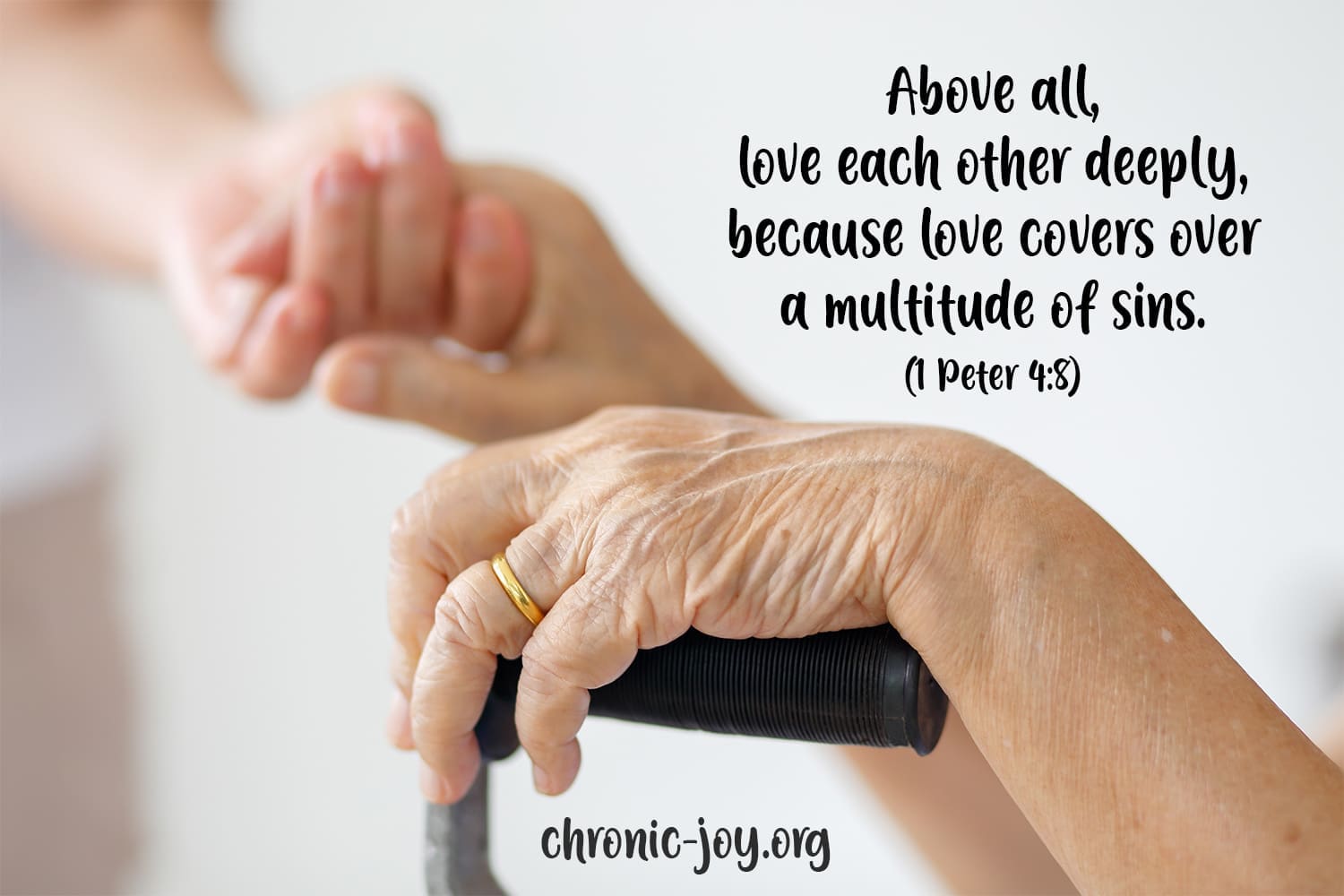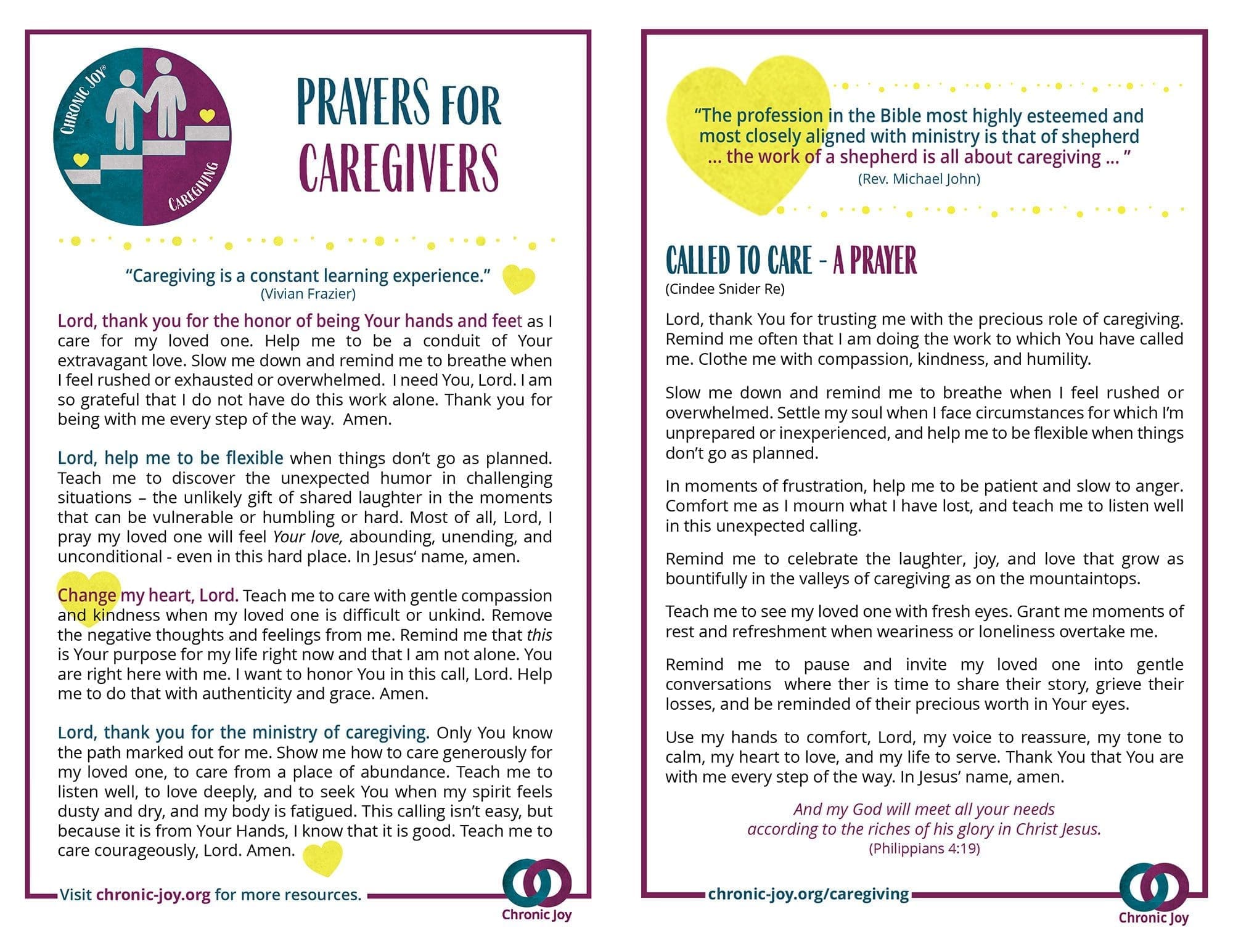
CAREGIVING
Above all, love each other deeply, because love covers over a multitude of sins. (1 Peter 4:8)
A caregiver is an individual who assists someone unable to care for his or her responsibilities and needs. This might include:
- help with finances
- health care decisions
- funeral arrangements
- shopping
- moving from a home to assisted living or a nursing home
- Power of Attorney for finances and health care
I find myself involved in all of these matters.
STAGGERING STATISTICS
- Sixty-nine percent of caregivers assist one person
- About half of that percentage gives care approximately eight hours per week
- 17 percent assists for 40 or more hours per week.
- The average length of caregiving is a bit over four years.
I have been caring for my loved one for 14 years, and for a while, I was simultaneously caring for two family members.
SEEKING GOD’S HELP
There are times I’ve felt resentful about my caregiving responsibilities. When this happens, I go to Scripture. God says:
- The person I am caring for is made in His image (Genesis 1:26-28; Psalm 8:4-8).
- The person I am caring for has a body, mind, and soul (Genesis. 2:7; Ecclesiastes 12:7; John 3:6).
These need to be at the forefront of my caregiving. This means checking my emotions, thoughts, motives, and actions to ensure they are loving. I have learned to ask myself who I am angry with and to identify false thoughts, such as:
- “There’s no way I can do this for the long haul,”
- “I deserve better than this,”
- “Nobody can do it better than I can,”
- “No one cares about me except…,”
- “If I don’t do it, nobody will.”
Sometimes, I feel God has given me more than I can handle, so I ask Him daily for wisdom and strength through His Spirit (2 Peter 1:3).
GUARDING AGAINST BURNOUT
Burnout can become a problem for caregivers, sneaking up on us before we realize it’s happening. Burnout is a feeling of emotional or physical exhaustion after prolonged responsibilities with people and situations that demand our time, strength, and energy. Indicators are:
- detaching ourselves from other people
- headaches
- exhaustion
- insomnia
- depression
- forgetfulness
- relationship difficulties
THINGS TO REMEMBER AS WE GO THROUGH CAREGIVING’S UPS AND DOWNS
- UNDERSTAND THE AGEING PROCESS—I talk with my doctor and a counselor about what to expect at certain ages so I will be prepared instead of surprised.
- ATTEND TO MY HEALTH—I set personal health goals, see my doctor as needed, and spend time with others.
- EVALUATE MY HEART—What are my desires, fears, insecurities, and expectations showing me? Where I am struggling? What is affecting my ability to give care?
- STAY IN FELLOWSHIP—For me, this means going to church and making time for Bible study and social gatherings (Hebrews 10: 24-25).
- REMEMBER THAT CAREGIVING IS A SACRIFICE—I try to remember that caregiving is a blessing, though sometimes in disguise.
- MY RESPONSIBILITY IS TO SERVE THE LORD—When I want to run away from the responsibility of caregiving, I remind myself to be faithful to what God has called me to do.
- DEVELOP A POSITIVE SUPPORT SYSTEM—When begin to feel discouraged, I call on friends and family who have a positive outlook on life.
- I AM NOT PERFECT—As much as I would like to believe that I am perfect, the simple fact is that none of us are.
- I HAVE A TENDENCY TO BE A PEOPLE PLEASER—My responsibility is to serve the Lord, not to please His people.
- CHECK MY “FIX-IT” ATTITUDE—When I’m tempted to start fixing things, I remind myself that my role is not to fix, but to serve.
- ENLIST COMMUNITY ORGANIZATIONS—It’s a good idea to be aware of the organizations in our communities that offer in-home respite care, adult daycare programs, or short-term nursing homes.
- ASK FOR HELP—Asking for help is difficult, but so necessary.
When I begin to feel resentful, angry, or discouraged, feeling like there’s no escape from caregiving responsibilities, I remind myself that Jesus blessed me with the privilege of caring for my loved one.
WHAT A DIFFERENCE TWO WORDS CAN MAKE!
These two acronyms were shared at a recent conference.
PRISON
PHYSICALLY exhausted and fatigued
RESENTFUL—bitter and angry
ISOLATED—lonely and misunderstood
STRESSED—guilty and torn
OVERWHELMED—helpless
NEGLECTED—unappreciated
PRIVILEGE
PRAY to have a servant’s heart. (Ephesians 6:7)
REALIZE that God has chosen you for this assignment. (Romans 8:28)
IDENTIFY attitudes that may be separating you from God. (Psalm 51:10)
VALUE this opportunity. (1 Peter 1:6)
INVEST your life in the life of another. (Galatians 6:2)
LEARN to live one day at a time. (Psalm 118:24)
EXCHANGE your weakness for Christ’s strength. (Philippians 4:13)
GIVE UP expectations. (Proverbs 12:25)
EXPERIENCE a deeper intimacy with God. (Psalm 139:7-10)
I have learned to be mindful of who I am and what I can do. When I become agitated with my loved one and critical of others, I take a mental health break. One of my biggest challenges has been finding quiet time with the Lord. When I don’t stay in the Word, my strength (which comes from Him) is limited.
Caring for my loved one is a privilege, but unless I care for myself and my relationship with God, I will struggle to care for my loved one.
Most importantly, I’ve learned that when I am down, all I need to do is look up!


SUSAN E. BUTCHER
Susan is a certified life coach through the American Association of Christian Counselors, a grief counselor, and a freelance writer. Additionally, she is a seasoned speaker and Bible teacher. She lives in Milwaukee, WI.

Prayers for Caregivers
Lord, thank You for the ministry of caregiving. Help me be flexible, kind, and intentional (especially when I'm weary) as I act as Your hands and feet. Amen.

Recent Comments